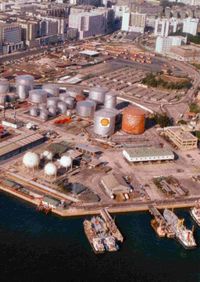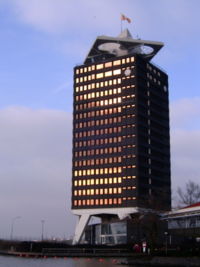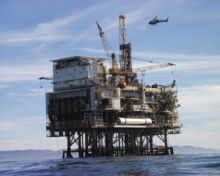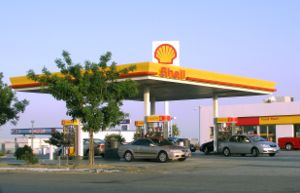Royal Dutch Shell
2007 Schools Wikipedia Selection. Related subjects: Companies
| Royal Dutch Shell PLC | |
 |
|
| Type | Public ( LSE: RDSA / RDSB) |
|---|---|
| Founded | 1907 |
| Headquarters | The Hague, The Netherlands |
| Key people | Jeroen van der Veer, CEO Jorma Ollila, Chairman |
| Industry | Oil and gas |
| Products | Oil Natural gas Petrochemicals |
| Revenue | |
| Net income | |
| Employees | 112,000 |
| Website | www.shell.com |
Royal Dutch Shell PLC is a multinational oil company (" oil major") of British and Dutch origins. It is one of the largest private sector energy corporations in the world, and one of the six " supermajors" ( vertically integrated private sector oil exploration, natural gas, and petroleum product marketing companies). The company's head offices (also known as the "central offices") are in The Hague and London ( Shell Centre) .
The company's main business is the exploration for and the production, processing, transportation and marketing of hydrocarbons (oil and gas). Shell also has a significant petrochemicals business ( Shell Chemicals), and an embryonic renewable energy sector developing wind, hydrogen and solar power opportunities. Shell is incorporated in the UK with its corporate headquarters in The Hague, its tax residence is in the Netherlands, and its primary listings on the London Stock Exchange and Euronext Amsterdam (only "A" shares are part of the AEX index).
Shell's revenues of $318.8 billion in 2006 made it the second-largest corporation in the world by revenues behind only ExxonMobil. Its 2006 gross profits of $26 billion made it the world's second most profitable company, after ExxonMobil and before BP. Forbes Global 2000 in 2006 ranked Shell the seventh largest company in the world. It operates in over 140 countries. In the United States, its subsidiary is Shell Oil Company, with headquarters in Houston, Texas, and is one of Shell's largest businesses.
History
The Royal Dutch/Shell Group of companies was created in February 1907 when the Royal Dutch Petroleum Company (legal name in Dutch, N.V. Koninklijke Nederlandsche Petroleum Maatschappij) and the "Shell" Transport and Trading Company Ltd of the United Kingdom merged their operations - a move largely driven by the need to compete globally with the then monopolistic American oil company, Standard Oil. The terms of the merger gave 60% of the new Group to the Dutch arm and 40% to the British. To celebrate its centenary in 2007 Shell launched a scholarship fund
Royal Dutch Petroleum Company was a Dutch company founded in 1890 by Jean Baptiste August Kessler, along with Henri Deterding and Hugo Loudon, when a Royal charter was granted by Dutch king Willem III to a small oil exploration company known as "Royal Dutch Company for the Exploration of Petroleum Wells in the Dutch Indies".
The “Shell” Transport and Trading Company (the quotation marks are official) was a British company, founded in 1897 by Marcus Samuel and his brother Samuel Samuel.
In 1919, Shell took control of the Mexican Eagle Petroleum Company and in 1921 formed Shell-Mex Limited which marketed products under the “Shell” and “Eagle” brands in the United Kingdom. In 1931, partly in response to the difficult economic conditions of the times, Shell-Mex merged its UK marketing operations with those of British Petroleum to create Shell-Mex and BP Ltd, a company that traded until the brands separated in 1975.
In November 2004, following a period of turmoil caused by the revelation that Shell had been overstating its oil reserves, it was announced that the Shell Group would move to a single capital structure, creating a new parent company to be named Royal Dutch Shell plc, with its principal listing on the London Stock Exchange and the Amsterdam Stock Exchange and its headquarters in The Hague in the Netherlands. The unification was completed on 20 July 2005. Shares were issued at a 60/40 advantage for the shareholders of Royal Dutch in line with the original ownership of the Shell Group.
Under the old capital structure, Shell's ADRs were traded on the New York Stock Exchange under RD (Royal Dutch) and SC (Shell).
Origin of the name and logo
.
The origin of the brand name “Shell” is linked to the origins of The "Shell" Transport and Trading Company. In 1833, the founder's father, also Marcus Samuel, founded an import business to sell seashells to London collectors. When collecting seashell specimens in the Caspian Sea area in 1892, the younger Samuel realised there was potential in exporting lamp oil from the region and commissioned the world's first purpose built oil tanker, the Murex, to enter this market. By 1907 the company had a fleet of oil tankers. The Shell emblem is one of the most familiar commercial symbols in the world. Known as the "Pecten" after the sea shell, the giant scallop, Pecten maximus, on which its design is based, the current version of the logo was designed by Raymond Loewy and introduced in 1971.
Businesses
One of the original Seven Sisters, Royal Dutch/Shell is the world's second-largest private sector oil company by revenue, Europe's largest energy group and a major player in the petrochemical industry.
Core Businesses
Shell has five core businesses: Exploration and Production ( the "Upstream"), Gas and Power, Refining and Marketing ( the "Downstream"), Chemicals, and Trading/Shipping, and operates in more than 140 countries.

Shell’s primary business was, and is, the management of a vertically integrated oil company. The development of technical and commercial expertise in all the stages of this vertical integration from the initial search for oil (exploration) through its harvesting (production), transportation, refining and finally trading and marketing established the core competencies on which the Group was founded. Similar competencies were required for natural gas, which has become one of the most important businesses in which Shell is involved and which contributes a significant proportion of the company's profits. Whilst in the past the vertically integrated business model gave significant economies of scale and provided Shell with the opportunity to establish barriers to entry both geographically and on a more global scale this has been less a possibility in more recent times. As a result although the vertical integration remains there is much less interdependence between the businesses and each is now charged with being a self-supporting independent business without cross subsidies from other parts of the business chain. Shell's oil and gas business is increasingly an assembly of independent and globally managed business segments each of which must be profitable in its own right. This can be a source of criticism as some consumers see huge profits accruing from upstream income whilst price rises instituted by the independent downstream business anger motorists and other consumers.

The "Downstream" (which now also includes the Chemicals business) generates 1/3rd of Shell's profits worldwide and is most recognised by its global networks of more than 40,000 petrol stations and its 47 Oil refineries.
Chemicals
The chemicals business, involving the production and marketing of a range of hydrocarbon-derived chemical products, was a logical step downstream from the processing of crude oil in the refinery. Some of the chemicals diversifications, e.g. agrichemicals, have been disposed of following major restructuring in Shell Chemicals over the past ten years, but there is still a large core chemicals business within the company.
Diversification
Over the years Shell has occasionally sought to diversify away from its core oil, gas and chemicals businesses. These diversifications have included nuclear power (a short-lived and costly joint venture with Gulf Oil in the USA); coal (Shell Coal was for a time a significant player in mining and marketing); metals (Shell acquired the Dutch metals-mining company Billiton in 1970) and electricity generation (a joint venture with Bechtel called Intergen). None of these ventures were seen as successful and all have now been disposed of.
In recent years Shell has moved tentatively into alternative energy and there is now an embryonic " Renewables" business which made investments in solar power, wind power, hydrogen, and forestry. The forestry business went the way of nuclear, coal, metals and electricity generation, and was disposed of in 2003. Shell is, however, one of the world's largest investors in several renewables fields, such as solar and wind . In 2004, Shell ranked fourth worldwide in terms of sales of solar products . Shell is also one of the world's largest investors in wind energy - Shell WindEnergy is to have a major share in the world's largest wind farm, the London Array (1GW) .
Shell also is involved in large-scale hydrogen projects. HydrogenForecast.com describes Shell's approach thusfar as consisting of "baby steps", but with an underlying message of "extreme optimism".
Business priorities
Shell's principal focus remains on its core business activities. The strategy is described as being to invest in “more upstream and profitable downstream" . Capital investments in 2006 totalled $24.896 billion of which just $418 million (< 2%) was in businesses (including Renewables) other than the core Oil, Gas and Chemicals sectors. .
Ownership
Prior to unification on 20 July 2005, the group was a dual listed company. The two holding companies were the Royal Dutch Petroleum Company of the Netherlands and the Shell Transport and Trading Company plc of the United Kingdom. These two companies jointly owned all the operating companies in the group, although some (e.g. Shell Canada) also have local shareholders and are traded on local stock markets. The Shell interest in subsidiaries was always divided 60/40 in favour of Royal Dutch. In many cases, subsidiary companies are held in partnership with other companies or governments.
Even now, likely for tax reasons, the company's shares are divided into two classes, A and B, representing the former Royal Dutch and Shell shares respectively.
Although to meet company law in all countries, there were executive and non-executive nominated directors of both Royal Dutch and Shell Transport and Trading, the Group had in fact been run by an executive body called the "Committee of Managing Directors" (CMD), whose members were the (executive) Managing Directors of the two parent companies.
Management
Executive Committee:
- Jeroen van der Veer, Chief Executive of Royal Dutch Shell,
- Linda Cook, Executive Director Gas & Power
- Malcolm Brinded, Executive Director Exploration & Production,
- Peter Voser, Chief Financial Officer
- Rob Routs, Executive Director Downstream Oil Products & Chemicals
On 4 August 2005, the board of directors of Royal Dutch Shell plc announced the appointment of Jorma Ollila, then Chairman and CEO of Nokia, to succeed Aad Jacobs as the company’s non-executive Chairman from 1 June 2006. Ollila is the first Shell Chairman to be neither Dutch nor British.
In March 2007 it was announced that Mr. van der Veer's contract as CEO would be extended to June 2009 some twenty months beyond his normal Shell retirement date of October 2007. . He will be the first modern executive director of Shell to stay in office beyond the age of 60.
Corporate responsibility and Reputation
The risks attached to much of the business operations of Energy/Oil companies, such as Shell, are such that their operations are subject to particular scrutiny by stakeholders - especially environmental and human rights groups and local communities. Over the years Shell has been criticised in respect of a number of its operations. These have included its businesses in South Africa and Nigeria (especially in relation to public unrest of the Ogoni and the execution of Ken Saro-Wiwa) as well as its attitude to the environment (e.g. the disposal of the Brent Spar production platform in Britain).
Shell’s response to the problems of Brent Spar and Nigeria was to launch an internal review of processes and an external communications campaign to persuade stakeholders of their commitment to Corporate Social Responsibility. In response to criticism of its track record on environmental matters Shell published an unequivocal commitment to Sustainable Development, supported by executive speeches reinforcing this commitment . At the same time Shell was one of the first companies to leave the Global Climate Coalition . Shell Chairman Philip Watts gave a 2003 speech in Houston calling for skeptics to get off the fence and take action "before it is too late". Delivering the annual business lecture hosted by Greenpeace in 2005, Shell chairman Lord Oxburgh said that we must act now on global warming or face a "disaster", and encouraged governments to provide a regulatory framework to encourage the reduction of greenhouse gas emissions. "Our job is to respond in a positive way to a regulatory environment that has to be determined by government ... given the urgency, we have to start now."
Shell's commitment to Corporate Social Responsibility also includes its well- respected LiveWIRE Programme. This programme has over 21 years experience of encouraging young people to start and develop their own businesses in the UK and elsewhere in the world (26 countries)
Shell has said that it is committed to listening to stakeholders: "Your opinions are important to us and we want to listen and respond as best we can to your comments and concerns". This included the setting up of a global internet based facility for whistleblowers to report alleged violations of the law or of Shell General Business Principles (the SGBP); a voluntary code of ethics pledging transparency, integrity and honesty in all of Shell’s business dealings. Whistleblowers are asked to provide identity details but anonymous reports are also accepted. The Helpline is available to “customers, suppliers, partners, advisers and employees of Shell”.
Corporate communications
Much of Shell's reputation building advertising concentrated on the embryonic Renewables business despite the fact that this remains a very small business compared with the core hydrocarbons extraction, processing and marketing operations. The corporate advertising campaign was (like a similar campaign by BP) described as “ Greenwash” by some NGO critics , but praised by other commentators . In response to questions which focused on the small percentage of its capital investment programme that was directed towards alternative energy Shell said that it would be "pointless" to say exactly how much of capital expenditure was going into renewable energy schemes. CEO Jeroen van der Veer indicated that the investment in renewables was small, saying it would be "throwing money away" to invest in alternative energy projects that were noncommercial and people could not afford to buy .
Oil Reserves
Shortly after Shell's well-funded initiatives designed to enhance its reputation with key stakeholders there came, in 2004, a disclosure about the overstatement of oil reserves which was seen as the most serious crisis encountered in the Group’s nearly 100 years of history. This crisis led to respected publications such as “ The Economist” asking whether Shell could be seen as “another Enron”. Berger & Montague, an American law firm then suing Shell said that an “enormous” deception had harmed shareholders and “severely overstated” the firm's market value “recklessly violated accounting rules and guidelines, which resulted in an enormous and shocking overstatement of oil and gas reserves.” The crisis led to the dismissal of the Group’s CEO Philip Watts and prompted a major reorganisation of the Shell Group.
Other recent problems
Royal Dutch Shell's image suffered another blow when problems arose with the massive Sakhalin-II project in Russia and the controversial Corrib Gas Field development in Ireland. Shell's social investment initiative the Shell Foundation has also run into some controversy. In 2007 Friends of the Earth alleged that the damage caused by Shell's oil activities to local communities and the wider environment could be assessed at $20 billion
Combination of Royal Dutch and Shell

On 28 October 2004, the company announced its proposal to merge Royal Dutch and "Shell" Transport and Trading into one entity, Royal Dutch Shell plc, to be "incorporated in the UK but headquartered and tax resident in the Netherlands". The new parent company's primary listing will be on the London Stock Exchange. On 28 June 2005 investors in both Shell Transport and Trading and Royal Dutch approved, at their Annual General Meetings, plans to merge the Group's dual-ownership structure and create a single company worth £120bn ($219bn). The new company now operates in 140 countries and employs around 122,000 people.
The type of business structure now to be created was not legally possible in 1907 when the Group was established, and the unique form of organisation that was then adopted by Shell, although durable, had come under criticism in recent years. Some critics thought that as the two parent companies had separate boards, with separate memberships, this meant that there was a certain amount of (undesirable) independence of each of the companies from the other. Others felt that the real power in Shell lay not with the two parent company boards at all but with the "Committee of Managing Directors" (CMD), which had no legal status but nevertheless took all the key operational decisions. The new organisation structure follows a more conventional business model (e.g. in line with most other private sector oil companies) and most commentators have commented favourably on the change, which they believe will establish a more transparent and accountable corporation. The CMD is abolished under this new structure, board meetings will be more executive in character, and there will (now) only be one "Shell" AGM each year.
Corporate Governance
Traditionally Shell was a heavily decentralised business worldwide (especially in the downstream) with operating companies in over 100 countries each of which operated with a high degree of independence. The upstream) tended to be far more centralised with much of the detailed technical and financial direction coming from the central offices in The Hague. Nevertheless there were very large “Exploration and Production” companies in a small number of major oil and gas production centres such as the United Kingdom (Shell Expro, a Joint Venture with Exxon), Nigeria, Brunei, Oman etc.
The downstream business, which in some countries also included oil refining, generally included a retail petrol station network, lubricants manufacture and marketing, industrial fuel and lubricants sales and a host of other product/market sectors such as LPG, bitumen etc. The custom and practice in Shell was that these businesses were essentially local in character and that they were best managed by local “operating companies” – often with middle and senior management reinforced by expatriates. In the 1990s this paradigm began to change and the independence of operating companies around the world was gradually reduced and today virtually all of Shell’s operations in all of its various businesses are much more directly managed from London and The Hague. The autonomy of “operating companies” has been largely removed as more “global businesses” have been created in all sectors. London is the headquarters of the downstream and other businesses and services whilst the management of the upstream business is the primary activity in the offices in The Hague.
Through most of Shell’s history it’s business in the United States Shell Oil Company was substantially independent with its stock (“Shell Oil”) being traded on the NYSE and with little direct involvement from the Group’s central offices in the running of the American business. This also changed in the 1990s when Shell firstly bought out the shares in Shell Oil that they did not own and then took a more hands on approach in the running of the business. In Canada (also hitherto very independent) Shell intends to purchase the shares in Shell Canada that it does not own in order to apply the new global business model to its Canadian operations following the American model.
Profit announcement
On 2 February 2006 Shell released details of its 2005 financial performance. Profits broke the record for the greatest annual profit for a British (or Dutch) company, with a total of $26.261 billion, up by a third from the previous year. Some critics of Shell charged that the rise in profits was directly attributable to increases in pump prices of petrol and diesel accusing Shell of profiteering at the expense of motorists. In fact the profits of Shell and other oil majors are always, in the short term, linked in a linear way to changes in the price of Crude Oil. When Crude Oil prices rise the upstream (production) margin increase. The downstream (refining and marketing) margin is largely insensitive to the actual price level.
Merger speculation
Whilst other multinational oil companies indulged in mega mergers in the late 1990s early 2000s (BP with Amoco; Exxon with Mobil; Chevron with Texaco; Total with Elf and Petrofina) Shell stayed out of the fray. There has, however, continued to be speculation that merger/takeover opportunities have been under consideration at the top of Shell. The most favoured idea by some commentators is a major merger with BP which would create the world’s largest company. Another oft mooted option would be for Shell to take over the BG Group - something that was close to happening in the 1990s
Trivia
- British stand-up comedian Jimmy Carr used to work in management for the firm, before taking up a redundancy payment, and a career change. On the hit BBC show Top Gear Jeremy Clarkson pointed out that Royal Dutch Shell made £800,000 an hour, profit. Jimmy Carr expressed surprise saying "An hour? That's more than I make in a week!"
- British Conservative politician William Hague worked for a time for Shell on assignment from the Management consultants McKinsey.
- The leader of the Dutch Labour Party (PvdA) and minister of Finance of The Netherlands Wouter Bos worked for Shell.
- Paul de Krom, Member of the lower house of Dutch parliament and of the VVD ( People's Party for Freedom and Democracy) worked for Shell
- Enterprise software company Kalido was originally created and then spun-out of Shell.
- 88 year old war veteran and Shell critic, Alfred Donovan, beat Shell to the domain name Royaldutchshellplc.com when the merged company Royal Dutch Shell Plc was formed.



